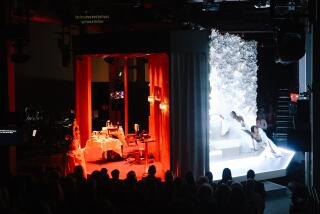MUSIC REVIEWS : Soprano Popp Opens Ambassador Season
- Share via
A few moments of jollity brightened the end of Lucia Popp’s recital at Ambassador Auditorium, Sunday afternoon, when the Vienna-based soprano offered as her third encore the Champagne Aria from Johann Strauss Jr.’s “Eine Nacht in Venedig.”
But the merriment was short lived. For her fourth and final post-performance addition, Popp went back to quietness and reflection--in a folk melody sung in her native Slovak--the prevailing mood of her entire program.
As had been the rest of the matinee recital, this Lullaby was exquisitely performed by the veteran soprano and her resourceful pianist, Armen Guzelimian.
But the downbeat mood expressed here and throughout the program seemed all-inclusive. All afternoon, one kept wishing for something loud and bombastic--perhaps even obnoxious. Gentility can be boring.
At 51, the singer from Uhorska Ves seems in fine fettle. Sunday, she took most of the first half of the recital to warm up--two in the afternoon is not the best time for most singers--but certainly did not disgrace herself in the meantime.
Five songs written by Dvorak in 1888 made a handsome beginning, with some beauteous inner contrasts highlighting mostly thoughtful moods. Here, as in a subsequent group of five excerpts from Mahler’s “Des Knaben Wunderhorn,” the singer delineated texts carefully and with lush vocalism, while Guzelimian supported wisely and well, and illuminated postludes with nuance and relish.
The same kinds of interpretive insights, as well as a more outgoing and reliable vocalism, characterized four Wolf songs--”Im Fruhling” and “An eine Aolsharfe” emerging with particular pertinence--and the closing group of Richard Strauss lieder, wherein the overripe blossoming of “Blauer Sommer” became for one listener the most touching climax of the event.
It hardly matters, when a singer is communicating, but there was an absence of high notes in this recital, though the second encore, Dvorak’s “Song to the Moon,” from “Rusalka” did net an acceptable, if not long-held, B-flat.
Still, what remained more obviously in short supply was variety, genuine contrasts of mood, tempo and detail. Most of this music moved slowly, described static conditions of mind or soul, and concentrated on the sad or lugubrious end of the emotional spectrum. Extroversion was largely missing.
Nevertheless, a rapt audience received the recital with great enthusiasm at its conclusion, and, during it, released numerous, murmurous flurries of approval.
The first encore was Richard Strauss’ “Allerseelen.”
More to Read
The biggest entertainment stories
Get our big stories about Hollywood, film, television, music, arts, culture and more right in your inbox as soon as they publish.
You may occasionally receive promotional content from the Los Angeles Times.










